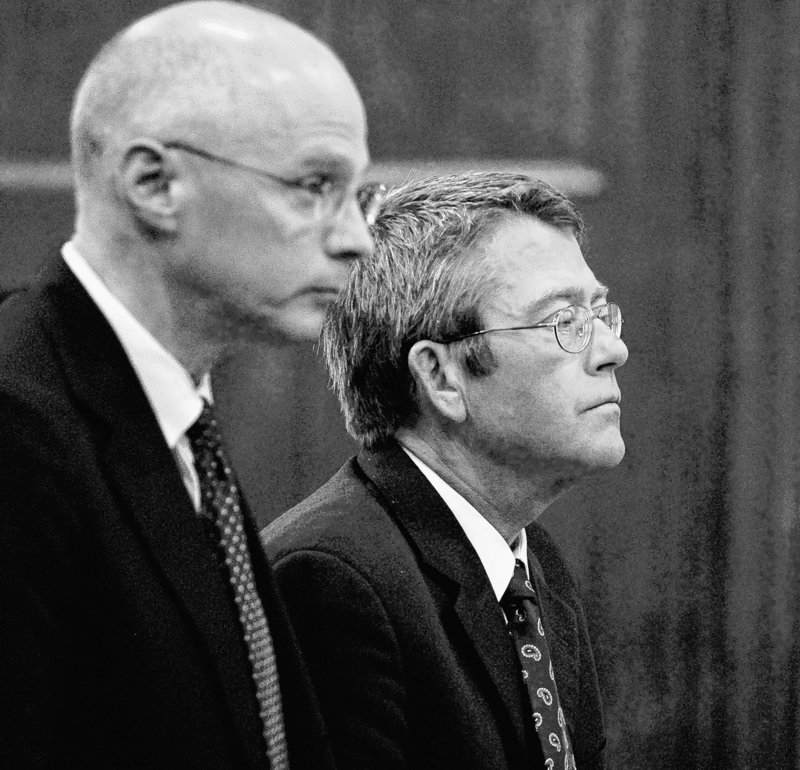PORTLAND – Six lawyers with the prestigious Verrill Dana law firm broke no ethics rules in their response to thefts by their partner John D. Duncan, a judge ruled Wednesday.
The lawyers acted reasonably and in good faith on the information they knew at the time, Maine Supreme Judicial Court Justice Donald Alexander wrote in the 35-page order.
Alexander presided over a disciplinary hearing this month for David Warren, James Kilbreth III, Eric Altholz, Mark Googins, Roger Clement Jr. and Juliet Browne.
The hearing was prompted by a complaint filed by the Maine Board of Bar Overseers, which governs the conduct of lawyers. J. Scott Davis, lead counsel for the board, argued that the lawyers broke a variety of ethics rules in the summer of 2007. He sought sanctions, which could have ranged from a simple reprimand to disbarment.
After weighing testimony from the three-day hearing, Alexander agreed with the Verrill Dana lawyers, who conceded that they were deceived by Duncan but said they handled the situation appropriately.
“When the true extent of Duncan’s misconduct was revealed, they promptly reported it and proceeded to make betrayed clients whole,” Alexander wrote. “With the clarity of hindsight, the respondents were perhaps too trusting when they had good reason to trust, but they committed no violations of the Code of Professional Responsibility.”
The judge’s order provided an emphatic answer to questions about the case that lingered for more than three years, including whether partners in the firm acted appropriately when Duncan’s misconduct surfaced.
“Even though it took a long time for this process to be completed, justice prevailed,” said Melissa Hewey, a lawyer with Drummond Woodsum who represented Kilbreth at this month’s hearing.
Hewey spoke for all six Verrill Dana lawyers after the release of Alexander’s order on Wednesday. “For a long time, there was a cloud over the respondents, David Warren in particular,” Hewey said.
Warren was managing partner at Verrill Dana from 1994 until he stepped down from that post in the wake of the scandal. He continues to practice with the firm.
“They did nothing wrong,” Hewey said. “They acted prudently, and this is a complete vindication.”
Davis, of the Board of Bar Overseers, is on vacation this week and read the order on his phone Wednesday afternoon. He said he will need some time to digest the decision.
“Obviously we’re disappointed,” he said. “We thought the facts had proven our case. But the judge has spoken and found the facts the other way.”
Duncan, a resident of Falmouth, had been a partner at Verrill Dana since 1978, and was regarded as one of the best lawyers in Maine for wills, trusts and estates. Within the firm, he had a reputation of unquestioned integrity.
In Alexander’s opinion, that reputation was part of the reason why the full scope of Duncan’s misconduct was not discovered until four months after suspicions arose about his billing practices.
In June 2007, Duncan’s secretary, Ellie Rommel, resigned from the firm and handed over a folder of evidence to another partner in her department, Gregory Foster. Copies of checks showed that Duncan had written checks to himself from the account of an elderly client, Janice Thomas. Rommel believed Duncan had been stealing from Thomas.
Foster turned the matter over to Warren, who confronted Duncan, who immediately confessed and apologized, breaking down in tears.
Duncan said he had earned the money but the checks were supposed to have been shared with the full partnership. Duncan said it was an isolated incident, no clients had been harmed, and the fees were properly billed.
“I believed him,” Warren told Alexander during the hearing on Dec. 13.
Warren advised the firm’s executive board — composed then of Kilbreth, Altholz, Googins, Clement and Browne — to accept Duncan’s apology and a repayment check of $77,500 in early July 2007.
Warren also was to inform the chair of Duncan’s department, Kurt Klebe, about the matter, in part so that Klebe could make sure procedures were in place to prevent such a situation from happening again.
But Warren did not meet with Klebe until roughly three months later, on Oct. 2. Warren told Alexander that he waited because he was concerned that Duncan was considering suicide. Warren said he didn’t want more people to know about the wrongdoing until Duncan was mentally stable. He also said he had no reason to think clients were in danger because he believed Duncan’s explanation about the Janice Thomas account.
Within a few days of his meeting with Warren, Klebe found evidence that Duncan had misappropriated funds from other clients.
Rommel, who had left the firm in June, contacted the firm on Oct. 5 through her lawyer, Daniel Lilley. He demanded that Verrill Dana preserve certain e-mails and other computer evidence for a potential lawsuit by Rommel for wrongful termination and other claims.
Later that month, the firm hired outside lawyers and accountants to do a full review of Duncan’s files. The audit revealed that Duncan had stolen from several clients and embezzled from the firm over a 10-year period. The thefts totaled around $300,000.
The partnership held emergency meetings, and voted to expel Duncan and report his misconduct to the Board of Bar Overseers, the Cumberland County District Attorney and the U.S. Attorney’s Office.
Duncan ultimately pleaded guilty to theft and tax evasion. He served two years in federal prison and received a lifetime disbarment.
Davis investigated the matter for about three years before filing the ethics complaints this fall against Warren and the firm’s executive board members. The central premise of his case was that the lawyers had a professional responsibility to report what they knew about Duncan’s misconduct in June and July 2007 to the Board of Bar Overseers.
At the hearing, Davis alleged that by accepting Duncan’s explanation — without reporting the matter and without a thorough internal investigation — the Verrill Dana lawyers engaged in “willful blindness” to the thefts. He said it was not up to the partnership to decide how serious Duncan’s violation was.
The lawyers argued that the reporting requirement is subjective, and despite Duncan’s admissions about the Janice Thomas account, they believed his initial story. They felt Duncan had breached the partnership agreement but it was not a violation of the bar rules that had to be reported to the Board of Bar Overseers.
Alexander ruled that their judgment call was reasonable.
“This disciplinary action against the respondents must be determined based on what they knew or believed at the time, when their actions were based on the uncertain evidence of the situation created by Duncan’s lies,” the judge wrote.
Alexander also affirmed Warren’s decision to wait three months before informing Duncan’s supervisor.
“The respondents did not take lightly their concern about a possible suicide, and the delay in further address of this matter until that concern was reduced, was humane, and was not an ethical violation,” Alexander wrote.
“Notably, there were no further improprieties and no harm to the firm or clients occurring within the three-month period from the July 9, 2007, executive committee meeting to October 2, 2007, when Kurt Klebe was advised of the matter and began his investigation which led, almost immediately, to the discovery of other improprieties.”
K.C. Jones, Verrill Dana’s current managing partner, sees the order as closure to the trauma caused by Duncan’s illegal acts.
“We have supported our colleagues throughout this long process, and we’re pleased with Justice Alexander’s decision,” Jones said. “This is very much a vindication for the firm.”
Jones said the firm appreciates its clients and friends who have stuck with Verrill Dana.
“Dealing with the Duncan matter has been a challenge, but we have moved on,” he said. “It’s apparent that our clients appreciate the firm’s core values, providing quality legal representation, serving charitable and community organizations, and providing services to many Mainers who can’t afford them.”
Staff Writer Trevor Maxwell can be contacted at 791-6451 or at:
tmaxwell@pressherald.com
Send questions/comments to the editors.




Success. Please wait for the page to reload. If the page does not reload within 5 seconds, please refresh the page.
Enter your email and password to access comments.
Hi, to comment on stories you must . This profile is in addition to your subscription and website login.
Already have a commenting profile? .
Invalid username/password.
Please check your email to confirm and complete your registration.
Only subscribers are eligible to post comments. Please subscribe or login first for digital access. Here’s why.
Use the form below to reset your password. When you've submitted your account email, we will send an email with a reset code.